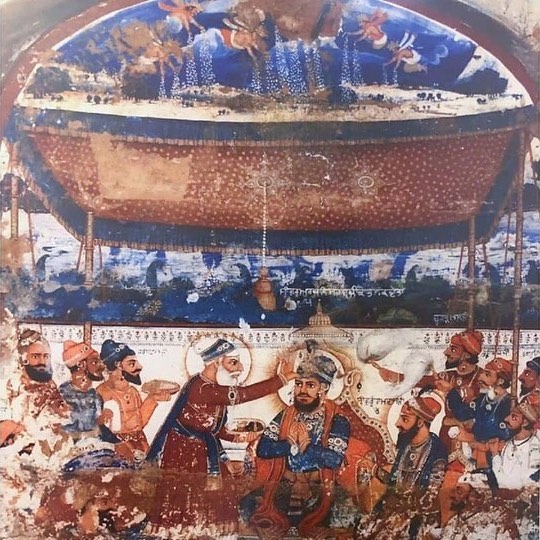|
Bhatt Harbans
Bhatt Harbans was a Brahmin bard in the court of Guru Arjan, whose two hymns are present in Guru Granth Sahib The Guru Granth Sahib ( pa, Ó©ŚÓ®üÓ©░Ó®é Ó©ŚÓ®ŹÓ©░Ó®░Ó©ź Ó©ĖÓ©ŠÓ©╣Ó©┐Ó©¼, ) is the central holy religious scripture of Sikhism, regarded by Sikhs as the final, sovereign and Guru Maneyo Granth, eternal Guru following the lineage of the Sikh gur ..., the holy book of Sikhs. : BHATT BANI References Sikh Bhagats {{Sikh-stub ...[...More Info...] [...Related Items...] OR: [Wikipedia] [Google] [Baidu] |
Brahmin
Brahmin (; sa, Óż¼ÓźŹÓż░ÓżŠÓż╣ÓźŹÓż«ÓżŻ, br─ühmaß╣ća) is a varna as well as a caste within Hindu society. The Brahmins are designated as the priestly class as they serve as priests (purohit, pandit, or pujari) and religious teachers (guru or acharya). The other three varnas are the Kshatriya, Vaishya and Shudra. The traditional occupation of Brahmins is that of priesthood at the Hindu temples or at socio-religious ceremonies, and rite of passage rituals such as solemnising a wedding with hymns and prayers.James Lochtefeld (2002), Brahmin, The Illustrated Encyclopedia of Hinduism, Vol. 1: AŌĆōM, Rosen Publishing, , page 125 Traditionally, the Brahmins are accorded the highest ritual status of the four social classes. Their livelihood is prescribed to be one of strict austerity and voluntary poverty ("A Brahmin should acquire what just suffices for the time, what he earns he should spend all that the same day"). In practice, Indian texts suggest that some Brahmins historicall ... [...More Info...] [...Related Items...] OR: [Wikipedia] [Google] [Baidu] |
Guru Arjan
Guru Arjan (Gurmukhi: Ó©ŚÓ®üÓ©░Ó®é Ó©ģÓ©░Ó©£Ó©©, pronunciation: ; 15 April 1563 ŌĆō 30 May 1606) was the first of the two Gurus martyred in the Sikh faith and the fifth of the ten total Sikh Gurus. He compiled the first official edition of the Sikh scripture called the Adi Granth, which later expanded into the Guru Granth Sahib. He was born in Goindval, in the Punjab, the youngest son of Bhai Jetha, who later became Guru Ram Das, and Mata Bhani, the daughter of Guru Amar Das. He completed the construction of Darbar Sahib at Amritsar, after the fourth Sikh Guru founded the town and built a sarovar. Guru Arjan compiled the hymns of previous Gurus and of other saints into Adi Granth, the first edition of the Sikh scripture, and installed it in the Harimandir Sahib. Guru Arjan reorganized the Masands system initiated by Guru Ram Das, by suggesting that the Sikhs donate, if possible, one-tenth of their income, goods or service to the Sikh organization (''dasvandh''). The ''Masan ... [...More Info...] [...Related Items...] OR: [Wikipedia] [Google] [Baidu] |
Guru Granth Sahib
The Guru Granth Sahib ( pa, Ó©ŚÓ®üÓ©░Ó®é Ó©ŚÓ®ŹÓ©░Ó®░Ó©ź Ó©ĖÓ©ŠÓ©╣Ó©┐Ó©¼, ) is the central holy religious scripture of Sikhism, regarded by Sikhs as the final, sovereign and Guru Maneyo Granth, eternal Guru following the lineage of the Sikh gurus, ten human gurus of the religion. The Adi Granth ( pa, Ó©åÓ©”Ó©┐ Ó©ŚÓ®ŹÓ©░Ó®░Ó©ź), its first rendition, was compiled by the fifth guru, Guru Arjan (1564ŌĆō1606). Its compilation was completed on 29 August 1604 and first installed inside Golden Temple in Amritsar on 1 September 1604. Baba Buddha was appointed the first Granthi of the Golden Temple. Shortly afterwards Guru Hargobind added Ramkali Ki Vaar. Later, Guru Gobind Singh, the tenth Sikh guru, added hymns of Guru Tegh Bahadur to the Adi Granth and affirmed the text as his successor. This second rendition became known as the Guru Granth Sahib and is also sometimes referred to as the Adi Granth. [...More Info...] [...Related Items...] OR: [Wikipedia] [Google] [Baidu] |
Sikh
Sikhs ( or ; pa, Ó©ĖÓ©┐Ó®▒Ó©¢, ' ) are people who adhere to Sikhism, Sikhism (Sikhi), a Monotheism, monotheistic religion that originated in the late 15th century in the Punjab region of the Indian subcontinent, based on the revelation of Guru Nanak. The term ''Sikh'' has its origin in the word ' (), meaning 'disciple' or 'student'. Male Sikhs generally have ''Singh'' ('lion'/'tiger') as their last name, though not all Singhs are necessarily Sikhs; likewise, female Sikhs have ''Kaur'' ('princess') as their last name. These unique last names were given by the Gurus to allow Sikhs to stand out and also as an act of defiance to India's caste system, which the Gurus were always against. Sikhs strongly believe in the idea of "Sarbat Da Bhala" - "Welfare of all" and are often seen on the frontline to provide humanitarian aid across the world. Sikhs who have undergone the ''Amrit Sanchar'' ('baptism by Khanda (Sikh symbol), Khanda'), an initiation ceremony, are from the day of thei ... [...More Info...] [...Related Items...] OR: [Wikipedia] [Google] [Baidu] |
_Bhumi_Puja%2C_yajna.jpg)


